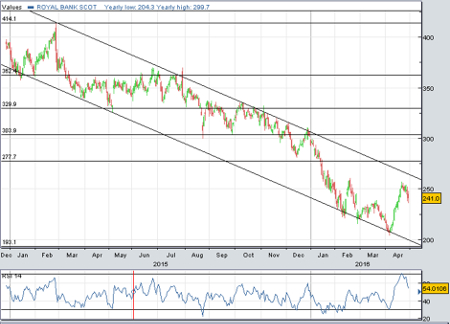RBS pays price for dividend freedom
29th April 2016 12:30
by Lee Wild from interactive investor
grew by a quarter over just two weeks this month after its share price bounced off a near-four-year low. Rivals and did well, too. But the froth has come off in recent sessions, and these results were nothing special. There are also concerns that a return to the dividend list may be delayed.
Losses almost-doubled to £968 million in the first three months of 2016, RBS confirmed Friday. It's because the taxpayer-owned lender last month paid the government £1.2 billion to remove a block put in place after the 2008 bailout. The so-called dividend access share, or DAS, guaranteed the Treasury would get its cash before other shareholders.
This quarter's deficit was slightly worse than expected and, without US operation Citizens, and with the investment bank a shell of its former self, income fell from £3.5 billion to less than £3.1 billion, as expected.
Encouragingly, margins stabilised at the UK Personal & Business Banking operation and RBS made more than last year from commercial banking as net loans and advances grew. However, scaling down the unit hammered income from investment banking, which tumbled into the red for the three months.
Elsewhere, the common equity tier 1 ratio - a key measure of financial strength - fell 90 basis points to a slimmer-than-expected 14.6%. Blame DAS and contributions into the main pension scheme for that.

And shareholders are still smarting from yesterday's confession from RBS that "there is a significant risk that the separation and divestment to which we are committed will not be achieved by 31 December 2017."
"Due to the complexities of Williams & Glyn's customer and product mix, the programme to create a cloned banking platform continues to be very challenging and the timetable to achieve separation is uncertain," it said Friday.
"RBS is exploring alternative means to achieve separation and divestment. The overall financial impact on RBS is now likely to be significantly greater than previously estimate [£1.7 billion]."
W&G was supposed to have been sold ages ago as a condition of RBS receiving state aid in 2008.
"Lower capital and the delay in completing the separation of W&G will mean that capital returns at RBS are likely to be delayed despite a better operating performance this quarter," write the banking team at Haitong Securities.
"RBS trades on reported [tangible net asset value] of 351p, down 1p quarter-on-quarter, and a [price/tangible book value] of 0.7x for a reported adjusted first-quarter 2016 [return on equity] of 10.9%."
This article is for information and discussion purposes only and does not form a recommendation to invest or otherwise. The value of an investment may fall. The investments referred to in this article may not be suitable for all investors, and if in doubt, an investor should seek advice from a qualified investment adviser.